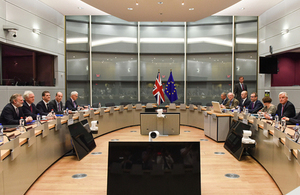Position papers published ahead of July negotiation
Position papers outlining how the UK will negotiate on important issues related to Brexit — and take steps towards fostering a new deep and special partnership with the EU after we leave — have been published today.

Negotiating table
Ahead of the second round of negotiations next week, the documents lay out the UK’s approach to issues related to our withdrawal from the EU on:
- Ongoing Union Judicial and Administrative Proceedings
- Nuclear materials and safeguards issues
- Privileges and Immunities
Each of the papers will be presented to the Commission for discussion next week.
Secretary of State for Exiting the European Union David Davis said:
These position papers mark the fair and transparent way that the UK is approaching Brexit negotiations ahead of the second round of talks next week — and demonstrate how deciding the shape of our future partnership with the EU is inextricably linked with our withdrawal talks.
While we’re leaving the EU we are not leaving Europe, and we want to continue cooperating with our friends and neighbours on issues of mutual importance including nuclear safeguards.
By ending the jurisdiction of the Court of Justice of the European Union, UK courts will be supreme once more. Our sensible approach to pending cases means there would be a smooth and orderly transition to when the court no longer has jurisdiction in the UK.
The papers lay out the following UK positions:
Ongoing Union Judicial and Administrative Proceedings
We want to ensure a smooth and orderly end to the jurisdiction of the CJEU in the UK.
There will likely be a small number of cases which are pending at the CJEU on the date we leave.
These might be cases that involve the UK as a party, or originated as preliminary references from the UK’s domestic courts — meaning they refer questions of interpretation, application or validity of EU law to the CJEU.
The UK’s position paper says that the CJEU should not be allowed to rule on UK cases which were not before the court on the day the UK leaves the EU.
This would apply even where the facts of the case occurred before withdrawal.
The UK’s approach reflects that we are leaving the EU and the jurisdiction of the CJEU will end — and that we will give as much certainty as possible to those who find their cases before the court at the point of withdrawal.
Nuclear Materials and Safeguards Issues
When the UK triggered Article 50, starting the process of leaving the European Union, Article 106(a) of the Euratom Treaty was also invoked as the Treaties are uniquely legally joined.
While the UK is leaving Euratom we want to continue working closely with the Euratom Community to help ensure a smooth and orderly exit and to pave the way for a future relationship that benefits the UK and the remaining 27 Member States.
And respecting our current obligations, the UK will look to agree Nuclear Cooperation Agreements with key non-EU states including the USA, Canada, Australia and Japan.
Privileges and Immunities
At the moment the EU, including its bodies, assets and employees, enjoys the same range of privileges and immunities across all its member states.
The UK sees the need, in the context of an overall settlement on withdrawal, for certain privileges and immunities to apply for a limited period after exit, in order to permit the EU a reasonable time in which to wind up its current operations here.
And in the future, the UK will seek a legally acceptable framework of privileges and immunities that allows for the smooth conduct of relations between the UK and the EU — as part of an ongoing deep and special partnership.
The papers can be viewed on our Article 50 and negotiations with the EU microsite here.